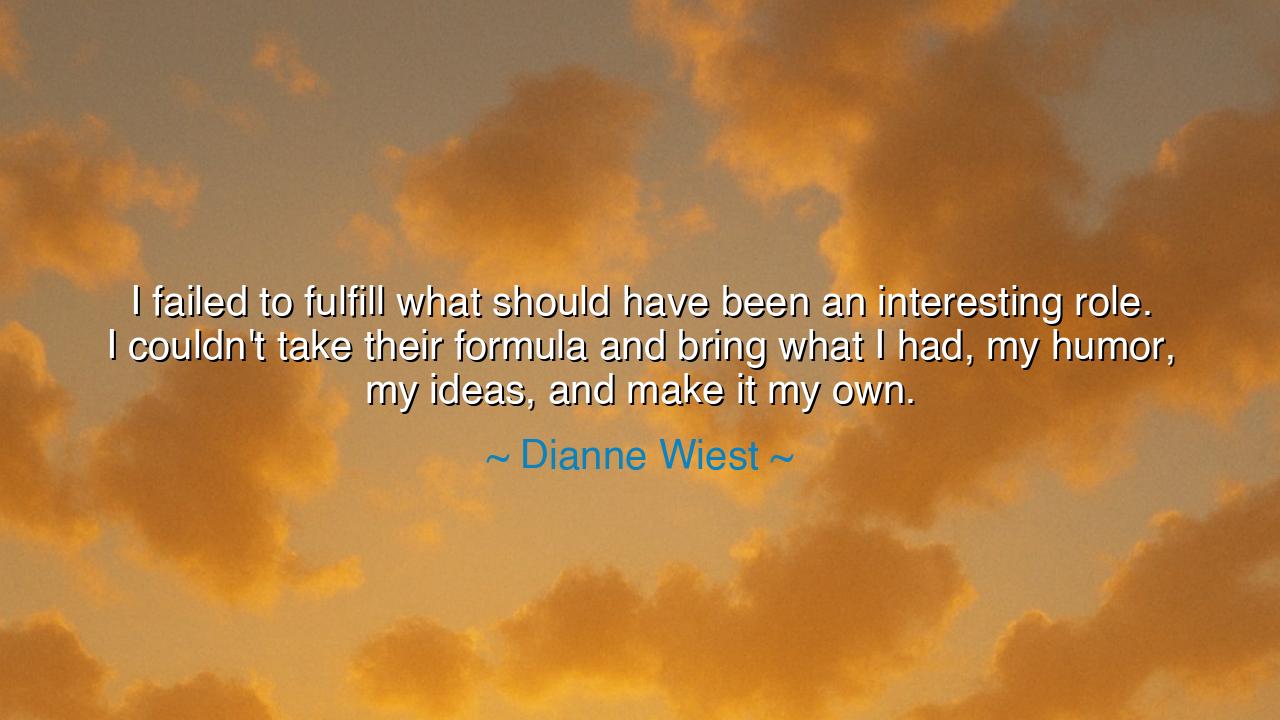
I failed to fulfill what should have been an interesting role. I
I failed to fulfill what should have been an interesting role. I couldn't take their formula and bring what I had, my humor, my ideas, and make it my own.






In the voice of Dianne Wiest, we hear not complaint, but confession — the kind of truth that only comes from one who has wrestled with her own craft: “I failed to fulfill what should have been an interesting role. I couldn’t take their formula and bring what I had — my humor, my ideas — and make it my own.” These are not the words of defeat, but of understanding — the acknowledgment that artistry is not obedience, but transformation. Her lament carries within it an ancient wisdom: that to merely follow another’s design is to lose one’s voice, and that creation without authenticity becomes a hollow echo of what might have been.
The ancients would have recognized this struggle. In the schools of Athens, the disciples of Socrates were taught not to memorize their master’s thoughts, but to think beyond them. Socrates himself refused to write his philosophy, for he believed that true knowledge lives only in conversation — in the living exchange between souls. So too does Wiest’s reflection teach us that the artist, whether in word or performance, must not become a vessel of another’s will. The formula, no matter how perfect, is lifeless without the spirit that animates it. A script, like a scroll, holds potential — but only when breathed upon by the performer’s own fire.
When Wiest says, “I failed to make it my own,” she is not speaking merely of acting, but of the human condition. For every person, in every walk of life, is given some script — expectations, traditions, systems, roles. Many live their days speaking lines written by others: what to do, how to speak, how to think. Yet greatness arises only when one dares to take that script and infuse it with individuality, with the unrepeatable essence of self. To do otherwise is to live half-awake — to perform existence rather than to inhabit it.
We can look to the story of Michelangelo, who, when asked to paint the Sistine Chapel, was given detailed instructions by the Church on what to depict and how. But he, unwilling to be a mere hand for another’s vision, locked himself in solitude and transformed the ceiling into a masterpiece of divine rebellion. What was meant to be simple decoration became a revelation of human longing, divine struggle, and eternal beauty. In refusing to obey the formula, Michelangelo fulfilled the spirit of creation. His work, like Wiest’s wisdom, reminds us that artistry demands courage — the courage to disappoint expectation in pursuit of truth.
Wiest’s words also speak to failure, that sacred teacher of the brave. She does not hide from her shortcoming; she honors it. For only those who dare to bring themselves wholly into their work can feel the sting of falling short. The failure she describes is not the failure of laziness, but of authentic effort — the kind of fall that comes when the soul reaches for something higher than imitation. The ancients revered such failure, for they knew it was the seed of wisdom. To fail while trying to be true is nobler than to succeed in pretense.
Her mention of humor and ideas is telling. Humor is the mark of humanity — it is the mind’s light against the heaviness of existence, the soul’s refusal to surrender to solemnity. Ideas are the breath of the creative spirit — the sparks that set the mind aflame. To suppress them in service of a formula is to betray the very gift that makes one alive. Wiest’s regret, then, is not that she failed to please others, but that she failed to give herself fully — to bring her laughter, her insight, her colors, into the grayness of a role already defined.
So let this be a teaching to all who hear: whatever task is given to you — be it the role of artist, parent, teacher, or friend — do not live it as a mere routine. Make it your own. Bring your essence into it, even if it trembles, even if it defies expectation. The world has no need for perfect replicas; it longs for living souls who transform what they touch. Be willing to fail, if failure means you tried to speak with your own voice. Be willing to fall short, if your reach was honest and full of heart. For authenticity, though it may wound, leaves behind the fragrance of truth — and truth, once spoken, never fades.
Thus, in the lament of Dianne Wiest, there lies not sorrow, but instruction: to live and to create is to risk yourself — to take what is given and breathe into it the pulse of your being. Do not fear the formula, but do not become its servant. Let your humor light your way, let your ideas guide your hand, and make everything you do a mirror of your soul. For that, and that alone, is the path to fulfillment — the path where failure itself becomes a form of triumph.






AAdministratorAdministrator
Welcome, honored guests. Please leave a comment, we will respond soon